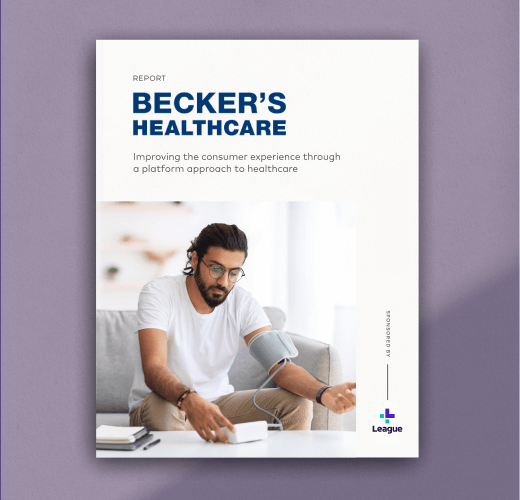Summary
- Providers can differentiate themselves and drive better healthcare economics by partnering with a CX platform provider and adopting a digital platform approach.
- Healthcare CX platforms enable providers to increase patient engagement, loyalty, and satisfaction through personalized, data-driven experiences and providing a seamless “digital front door” for patients to access care and resources.
- Partnering with a healthcare CX solution provider accelerates digital transformation and enhances care experiences. Integrated tech stacks, powered by AI/ML, deliver tailored content and care journeys that boost adherence and outcomes.
Healthcare is on the cusp of a platform revolution, and providers are uniquely positioned to benefit from this industry disruption. More so than any other party in healthcare, providers have a direct and intimate relationship with their patients. As healthcare CX platform adoption increases, providers have an opportunity to profoundly improve the frequency, depth and significance of their interactions with patients. Specifically, healthcare platformization will impact providers by:
- Increasing patient engagement and loyalty
- Improving patient outcomes
- Supporting business objectives and economics
Increasing patient engagement and loyalty
Healthcare providers face challenges with patient loyalty. Eighty percent of consumers would switch providers for convenience alone¹, and 26% would switch providers if they offered high-quality digital services². In an increasingly consumer-centric landscape, patients are more empowered than ever to choose their healthcare providers based on convenience and the strength of their digital offerings.
The patient engagement strategy many healthcare systems have used to date involves assembling a number of digital point products to help individuals manage their health. Each point product serves a specific purpose for patients, but the disparate systems and data sources create a fragmented patient experience that’s difficult to understand and navigate — discouraging engagement. By utilizing a healthcare CX platform, provider organizations can create a unified digital patient experience that brings together their high-value solutions with a focus on engagement and satisfaction.
“A platform creates a front end that collects all data points into one place that can be integrated … This creates a whole different experience in terms of engagement.”
MICHAEL PALMER
Former Chief Innovation and Digital Officer, Aetna
A healthcare CX platform provides the core interoperable infrastructure that allows providers to unite their electronic medical records (EMRs), point solutions, messaging applications and websites into a next-generation digital front door. This front door to healthcare makes it easy for patients to access, navigate and pay for care.
The embedded artificial intelligence (AI) and machine learning (ML) models within a CX platform improve engagement and loyalty by creating hyper-personalization for patients. These capabilities are used to deliver intelligent content recommendations that are unique to the specific health needs of the individual patient. Curated and deeply personalized healthcare experiences drive patient engagement and also create a more satisfied and loyal consumer.
91% of consumers say they are more likely to shop with brands that provide offers and recommendations that are relevant to them.
ACCENTURE RESEARCH³
A platform approach also unlocks new opportunities for providers to engage and re-engage patients beyond the in-person clinical setting, by meeting patients wherever they are. Interoperable healthcare platforms have the capability of powering truly omnichannel consumer experiences. Providers can shift their engagement model from a few brief episodes of care each year, to monthly, weekly and even daily interactions. A few examples of this expanded patient engagement strategy include:
- Communication with patients 24/7 to guide them to in-network points of care
- In-network telehealth meetings
- Orchestrated health journeys with daily activities, which establish the provider’s brand as a trusted source of health information
Improving patient outcomes
A healthcare CX platform provides a healthcare system with a foundation that is proactive, preventive and focused on health outcomes. To move the needle on both individual and population health, healthcare systems need to deliver care that is accessible and personalized.
The aggregation of data within an interoperable platform unlocks next-generation orchestration capabilities for health journeys. These orchestration features allow providers to send patients content that is tailored to their clinical care needs. The goal of these journeys is to keep patients engaged and encourage adherence with their care plans. Improved engagement and adherence reduce readmission rates and improve outcomes.
People who are more engaged in their healthcare are more proactive about their care.
HEALTH AFFAIRS RESEARCH⁴
Supporting business objectives and economics
Healthcare systems have invested heavily in their tech stack and are focused on maximizing this investment. Interoperable platforms integrate with the majority of healthcare technologies and incorporate software development kits (SDKs) so providers can embed and customize their CX to incorporate all of these valuable systems. Instead of negating prior technology investments, platforms actually increase their value by un-siloing data and aggregating it to create more comprehensive and actionable views of patients and populations.
Leveraging the expertise and resources of a CX platform partner, healthcare systems can accelerate the development and deployment of their CX platform. Additionally, the partner’s existing platform infrastructure and talent pool of experienced developers and experts enables organizations to save exponentially on talent costs and expedite time to value.
“A big positive for the [organization’s] IT department is not having to start from scratch on something and not having to build it yourself.”
SARAH DONNELLY
SVP of Product, League
A healthcare CX platform’s infrastructure is inherently modular and extensible, which means that providers can build upon it far into the future. CX platforms function as a partner in the ongoing innovation of a healthcare system. They provide continuous support and maintenance for providers, making sure the open-architecture platform is configurable and adaptable to changing market demands and new partnerships.
Taking a platform approach to the patient experience
Healthcare systems that recognize the changing industry landscape and promptly and successfully adopt a platform-based CX will gain competitive advantage. These organizations have an opportunity to be first to market with a differentiated CX platform — during a time when patients are eager for high-quality, digital healthcare experiences. With deeply personalized, data-driven health journeys that proactively guide patients 365 days a year, providers can improve patient outcomes and patient loyalty, to ultimately drive better healthcare economics.
To learn more about how a healthcare CX platform drives patient engagement and better health outcomes, read our eBook with Becker’s Healthcare.

Becker’s Healthcare
Learn why the future of healthcare CX requires a platform approach.
¹Source: Are These Three Patient Loyalty Myths Holding Your Organization Back?; NRC Health
²Source: Accenture 2020 Digital Health Consumer Survey; Accenture, August 2020
³Source: Why Brands Must Move From Communication to Conversation for Greater Personalization: Pulse Check 2018; Accenture
⁴Source: Judith H. Hibbard and Jessica Greene; What the Evidence Shows About Patient Activation: Better Health Outcomes And Care Experiences; Fewer Data on Costs; Health Affairs, Volume 32, No. 2 (2013): 207-214
